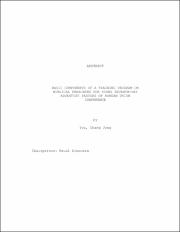Basic components of a training program on biblical preaching for young Seventh-day Adventist pastors of Korean Union Conference
Abstract
Seventh-day Adventist churches in South Korea are
demanding better quality of biblical preaching in their
pulpits. The demand is far greater than the current
ministerial workforce can supply. This crisis comes about
because there seems to be a lack of a consistent
Homiletical Training Program (HTP) for young pastors in the
Korean Union Conference (KUC).
This study aims to provide a systematic and regular
HTP for nonordained pastors in KUC. Particularly, the study
identifies the basic components and a training model for
the nonordained (unordained) ministers on biblical
preaching. Examination of this study was based on
documentary research and field research methods which
involved the interviews with church administrators and
survey questionnaires with 138 nonordained pastors. This
study uncovered three basic areas that the HTP addressed.
These were (1) spiritual training, (2) skill training
(homiletic), and (3) evangelistic preaching training.
This study also designed a training model, which
integrated classroom teaching (trainer’s role) and field
mentoring (field supervisor’s role). It was envisioned that
a 3-way partnership of trainers, field supervisors, and
trainees be developed.
The study culminates with a curriculum designed for
the classroom teaching components utilizing the suggested
training strategies: (1) 6 lectures on spiritual training,
(2) 7 lectures on preaching skills training, and
(3) 5 lectures on evangelistic preaching training. Other
useful tools such as the sheet of preaching evaluation, the
trainee’s learning covenant, and the field supervisor’s
learning covenant are listed in the appendixes. As a
result, this HTP will help to increase the effectiveness of
young pastors’ preaching ministry in KUC.


